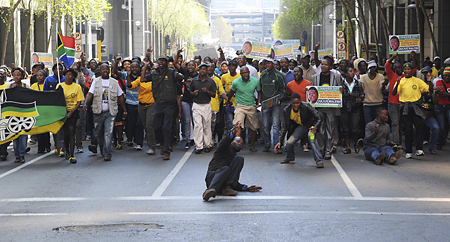Riots signal what’s wrong with South Africa’s economy

Image: TEBOGO LETSIE/The Times
The worst anti-immigrant violence in South Africa in seven years has highlighted the woes of an economy hit by power shortages and unable to create enough jobs to bring down poverty.
Two weeks of mayhem last month in Johannesburg and Durban left seven people dead and thousands of migrants fleeing their homes. TV screens and newspapers were splashed with images of mobs armed with knives and sticks, targeting foreigners and looting their shops. Many of them are seen as competitors for jobs in a nation with a 24% unemployment rate.
The tension underscores deteriorating prospects for an economy that’s suffered 40 days of rolling power blackouts this year and worsening labour relations characterised by violent strikes.
It also highlights the ruling party’s failure to do enough to improve the lives of millions of black South Africans, many of them still poor and jobless.
“Such attacks are not good and the general reputation of the country is impacted,” Mark Mobius, who oversees about $40 billion as the executive chairman of Templeton Emerging Markets Group in Singapore, said in an e-mailed response to questions. “They are symptomatic of the general unemployment situation, the lack of investment, the inability of the government to make labour laws more flexible and a general problem with encouraging both domestic and foreign investment.”
The riots occurred almost a year after mineworkers ended a five-month wage strike that shut the world’s largest platinum mines, followed by stoppages that forced carmakers such as General Motors Co. to halt production. Rivalries between labour unions may contribute to further violent industrial action this year, Robert Besseling, an Africa analyst at IHS Global Ltd. in London, said in an e-mailed note to clients on May 6.
Credit-rating companies, such as Moody’s Investors Service, have warned for years that social tensions are a risk to the economy and restrict the sovereign rating. Moody’s downgraded South Africa in November to Baa2, the second-lowest investment- grade level.
“South Africa’s growing reputation for social volatility is deeply troubling,” Charles Laurie, head of Africa at global risk analysis company Verisk Maplecroft in London, said in an e- mailed response to questions. The business environment “is already reeling from the country’s third-rate electricity system, volatile labor pool and rancorous political environment,” he said.
ENERGY CRISIS
Parliament has been disrupted several times since President Jacob Zuma won the last elections, with opposition groups demanding he repay public funds used to renovate his private residence at Nkandla. Zuma has denied wrongdoing and said several investigations have cleared him.
Investors’ perception of risk in the country has increased. The rand has slumped 14% against the dollar in the past year, while credit-default swaps have climbed 29 basis points to reach the fourth-highest among 24 emerging and major markets monitored by Bloomberg.
The rand rose 0.1% to 12.0276 against the dollar as of 1.39pm in Johannesburg.
The most immediate risk facing South Africa’s economy this year is an electricity crisis that’s cut production at companies such as Sibanye Gold Ltd., the biggest producer of gold, and Hulamin Ltd., the largest aluminum-product maker. State-owned power utility Eskom Holdings SOC Ltd. is implementing almost daily rolling blackouts as it struggles to meet demand.
The energy crunch threatens investment and puts the government’s growth target of 2% at risk. Last year’s expansion of 1.5% was the slowest pace since the 2009 recession. Zuma has pledged to boost growth to 5%.
“Eskom, from an investor standpoint, that’s probably our main concern right now,” Rune Hejrskov, a senior portfolio manager who helps oversee the equivalent of about $1.4 billion in emerging-market debt at Jyske Invest, said by phone from Silkeborg, Denmark.
Aside from the attacks on immigrants, South Africa also has seen service delivery protests by township residents over a lack of houses and services such as sanitation and water. This week, police used tear gas and rubber bullets to break up crowds during three days of demonstrations in Soweto.
There were at least 185 similar protests last year, according to Johannesburg-based Municipal IQ, which collates data on local councils.
The xenophobic attacks “certainly drive additional headline risks around social instability,” Mark Rosenberg, Africa director at Eurasia Group in New York, said by e-mail. “But overall, they are less of a concern than labor unrest or electricity shortages, which have more direct impacts on operations and growth.”
http://www.timeslive.co.za/sundaytimes/stnews/2015/05/08/riots-signal-whats-wrong-with-south-africa-s-economy



